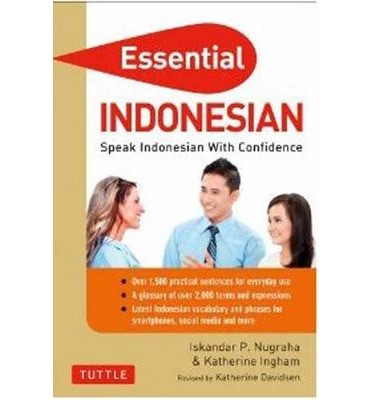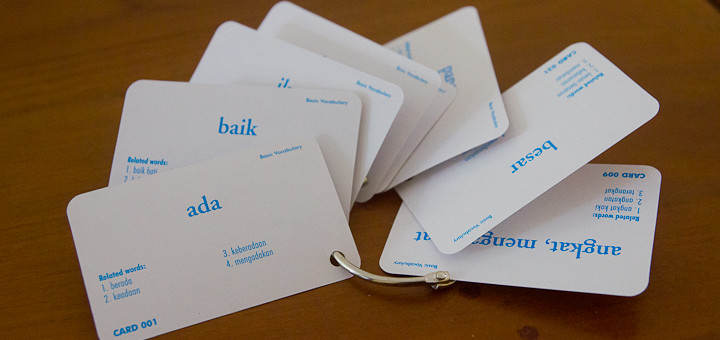The Best Books for Learning Indonesian
As an intellectual friend, an intimidating chap who can be cerebral in several languages and do the basics in a handful more, observed, “Indonesian really is the Lego bricks of languages.” And it really is: not just because it’s so easy for English speakers to pronounce, but because you can, quite literally, stick prefixes and suffixes and base words together, just as if you were playing with Lego. (If you’re new to Indonesian, do read my post on basic Indonesian, here.)
That said, as with any language, Indonesian does require learning. So, in the hope of discovering the best books for learning Indonesian, I’ve reviewed a range of language learning books from Tuttle, the publishing group that also runs Periplus, the lovely little bookshops you’ll see in Bali and the biggest Indonesian cities.
If you’re in Indonesia, you can buy all the Indonesian language learning books I’ve reviewed here from your nearest Periplus. Or please do order from BookDepository.com, which ships free to almost everywhere in the world. I’m an affiliate, which means if you buy after clicking on a link on my site, I get a small percentage of the sale.

Instant Indonesian: How to Express 1,000 Different Ideas with Just 100 Key Words and Phrases
I have to confess, my copy of this little book has already gone walkabout. That’s because it’s absolutely bloody brilliant: if you’re planning on spending a few months travelling in Indonesia, or even living here, working through Instant Indonesian before you go will set you up perfectly. I wish I’d had it before my first visit to Indonesia, and I’ll make sure Zac works through it before he starts Indonesian lessons in school: it’s one of the best books for learning Indonesian out there.
Indonesian, you see, lacks the fiddly grammar of many European languages – there are no cases, no genders, no complicated plurals, and verbs don’t change for person or tense. That means that, unlike in a language like, say, German, where you have to fiddle-faddle around with endings and der and das and die, you really can do an awful lot with 100 words, simply by swapping one word in for another.
Instant Indonesian‘s vocab is on point, the format is non-intimidating, the examples sound like things Indonesians actually say, and the authors build up gradually to more tricksy aspects of Indonesian (such as the correct mode of address, and how to identify who or what is the subject of a sentence). Although my Indonesian vocabulary includes no fewer than seven words for various types of boat, plus at least ten for different forms of street transport, a few of the words in here were new to me. And each of those new words has VASTLY enhanced my day to day Indonesian interactions.
Buy at BookDepository.com for $5.59 including worldwide shipping.

Tuttle Compact Indonesian Dictionary: Indonesian-English, English-Indonesian
In Indonesia, where even school text books are riddled with embarrassing errors, all dictionaries are NOT completed equal. I once unwisely bought an Indonesian-English pocket dictionary in a mall in Makassar. Typo-ridden, and constructed apparently at random by someone who clearly had a very limited command of English, it felt the need to provide definitions for both “zloty” and “ziggurat”. Zloty, you will be amused to learn, was defined as “a gaming table”.
This means that Katherine Davidsen’s Tuttle dictionaries are the gold standard when it comes to Indonesian-English dictionaries: this one has an impressive 30,000 words, both from Indonesian to English and from Indonesian to English. This is a very usable dictionary, with a focus on real world, informal Indonesian: the pocket version is good too. Davidsen lists words by both prefix and root, which means that if you want to look up menginap you don’t have to work out that the root word is inap not ginap. Where practical, she’ll give associated phrases in entry for the word you’re looking up: the entry for nipis contains “jeruk nipis – lemon or lime” rather than routing you elsewhere. I’ve also found her English-Indonesian section super-helpful for discussing topics from house repairs to holidays.
This is by far the best Indonesian-English dictionary out there, online or offline. One area where I am a little disappointed, though, is when it comes to food, fruit and vegetables. Until some brave, crazy fool produces a pan-Indonesian culinary dictionary, and some lunatic publishes it, asking questions at the market, then following up with Wikipedia Bahasa Indonesia and English Wikipedia is going to be your best bet.
Buy at BookDepository.com for $16.69 including worldwide shipping.

Indonesian Slang: Colloquial Indonesian at Work
This is an absolutely wonderful book – less Indonesian learning tool than a whirlwind tour through the culture, history and politics of an insanely complex archipelago, and it really is Indonesia in a nutshell. Lely Djuhari, a Javanese journalist turned development worker, and Christopher Torchia, who covered Indonesia for the Associated Press, make the acronyms, folklore, myths, clichés and down-home imagery of Indonesian slang endlessly fascinating.
Did you know that the term batu bakar (bake stones) refers to a Papuan peace-making ceremony? They give you the skinny on Papua’s conflict, too. Or how about a Wartawan Bodrex, a professional fake reporter, who goes to press conferences just to pick up the bribes for good coverage? Or what about the meaning and history of gotong royong, a concept enshrined within modern Indonesian culture? In Indonesia, a Romeo boyfriend is an Arjuna, after the Mahabharat hero, while someone who forgets their roots is “like a peanut forgetting his shell”. And Aceh, in news that will surprise no one, considers itself the “verandah of Mecca”.
If you live or work in Indonesia, if you’re studying Indonesian seriously, or if you’re dating an Indonesian, do pick up a copy of this book, less as a guide to the language, which has evolved and continues to evolve, and more as a cultural primer. If this ever gets into a new edition, it would be nice if they could fix the index, which isn’t always accurate.
Buy at BookDepository.com for $13.92 including worldwide shipping.

Indonesian Flash Cards
Shortly before a trip to Periplus, I was discussing tools for learning Indonesian with my mother. “What I REALLY want for learning Indonesian,” I said, “Is some kind of flashcard set up where it gives you the root word PLUS all the words that are made from it, so you can figure out how it all fits together.” And, eh voila! Tuttle’s Indonesian Flash Cards do exactly that – and come with a ring so that you can pick a set of cards, then carry it around in a pocket, or keep it by your bed.
The front of each card features a base word (such as ada), then a list of related words, in this instance berada, keadaan, keberadaan and mengadakan. The back defines the base word, then provides an example sentence, with translation, eg: Ada beratus-ratus bahasa di Indonesia. (There are hundreds of languages in Indonesia.) Below it, we learn that berada means “to be somewhere; to exist”, keadaan “situation, condition”, keberadaan “presence, existence” and mengadakan “to do, run, hold, organise, put on something”.
These flashcards are perfect for someone who’s already spent some time in Indonesia, picked up some Indonesian, or studied some Indonesian, and started to wonder how the whole language fits together. They’re an outstanding vocabulary builder, particularly if your vocabulary of verbs is impoverished (mine is). I suspect the absolute beginner might find these confusing and overwhelming: Instant Indonesian makes a much better choice, despite the audio CD that comes with these. Tuttle also has a much simpler flashcard version for little kids, which comes with wallchart and parents guide.
Buy for $20.81 on BookDepository.com including worldwide shipping.

And Finally…. Essential Indonesian: Speak Indonesian with Confidence!
I’ve always been averse to phrasebooks – and I can see no reason to use a phrasebook nowadays when there’s Google Translate on hand (even though Google Translate is rubbish for Indonesian, it’s still quicker than looking up the phrase you need in a book). Still, I took a look at this phrasebook because I thought the emphasis on being able to speak, on language used in normal life and active learning might make it a useful tool. Like Instant Indonesian, Essential Indonesian is one of a multi-language book series, but, unlike Instant Indonesian, the format for Essential Indonesian doesn’t suit Indonesian at all.
Essential Indonesian‘s clunky tagline is “Start to Converse in Indonesian immediately!” So I almost threw the book out of the window when it decided that the words for “spring”, “summer”, “autumn” and “winter” were a priority to be learned in the first chapter – and didn’t include “dry season” and “rainy season”. Once it started giving me ordinal numbers and fractions, still in the first chapter, I was spitting blood, and when, at the start of chapter 2, it provided me with the terms of address Nyonya and Tuan for “Sir” and “Madam” – which I’ve NEVER heard used in Indonesia – I lost the plot. It also uses the word anda for “you”, throughout, a term that many Indonesian language courses teach but nobody apart from someone who’s done one of those bloody courses actually seems to use.
There probably is a learning style for whom this book is right. If you like learning vocabulary from long lists, or learned French or Spanish during the 1950s or 1960s, there will be a familiarity to the approach here. And if you’re not confident with languages, and like the phrasebook approach because everything is written down, this comprehensive book, ordered into thorough sections for situations like shopping or getting your hair cut, will give you sentences for most holiday occasions. If you want to learn Indonesian, however, this is no place to start.
Buy at BookDepository.com for $8.34 including worldwide shipping.
Interested in languages? Find out the 20 words of Indonesian you really need to know, or what it’s like navigating Maluku in pidgin Indonesian. Alternatively, read about our battle learning Mandarin, week by week.


I’d like to introduce you to my book if I may be so bold! It’s a way of remembering Indonesian vocab which is really fun!
My challenge with Indonesian was remembering the words so I created a huge collection of word associations to help me remember them. I then realised how useful this would be for others, so I created a book and an App! 😀
Many people here in Ubud love it and I’d love to hear your feedback.
http://www.lingolinks.biz